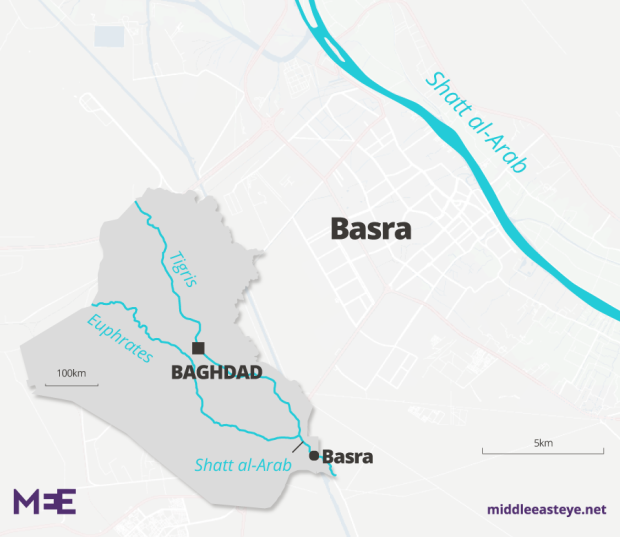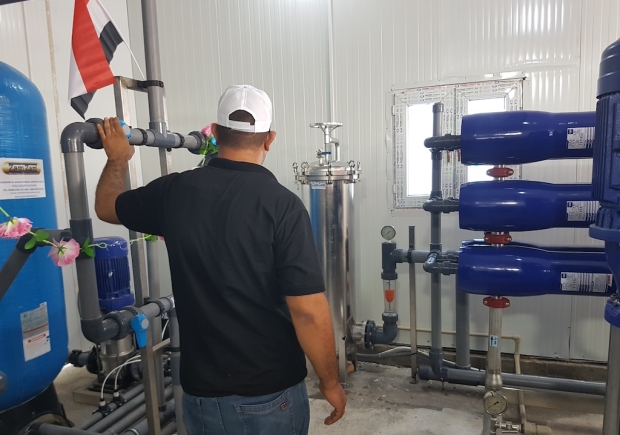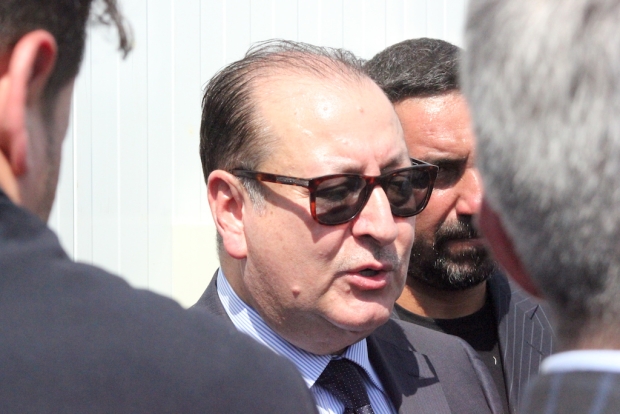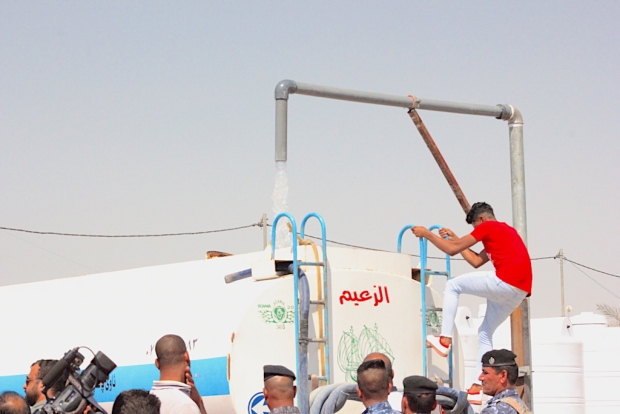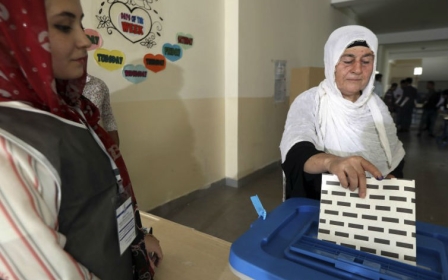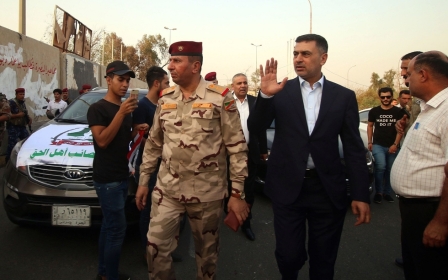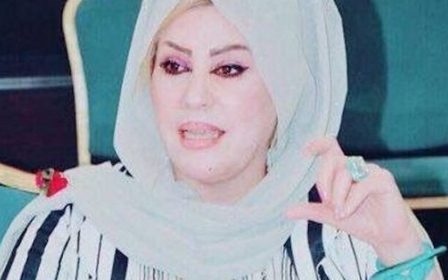How locals are turning Basra's poisoned rivers into drinking water
BASRA, Iraq - The city of Basra has endured many crises in its modern history, from the heavy casualties during the Iran-Iraq war to the violent suppression of uprisings against Saddam Hussein, to the sectarian violence after the 2003 invasion that saw bodies pile up on the streets.
But for some activists, the collapse of the city's water infrastructure is the most critical yet. In recent months, up to 100,000 people have been hospitalised as a result of water-related illnesses, while thousands have protested in the street over a lack of drinkable water.
Videos recorded by locals have shown water from the Shatt al-Arab river turned black by pollution or caked with salt.
The Shatt al-Arab is a confluence of the Tigris and Euphrates and runs through the centre of Basra - and was the historical inspiration for the Sinbad the Sailor stories. It is now polluted with "germs, chemicals, [and] toxic algae coupled with unprecedented concentrations of salt almost like that of seawater," Shukri al-Hassan, marine science lecturer at Basra University, told Reuters."It is the worst, ever," Naqib Alluaibi, a protest organiser in Basra, told Middle East Eye. "You can see that there are no birds flying because of the poisoned water in Shatt al-Arab. We are losing lives."
For years, both the local and central governments have failed to improve the situation. This July, as the lack of water reached critical levels, NGOs, civil society organisations and the private sector stepped in to try to plug the gap.
Basra is very rich with oil, it is the lung of Iraq - that means Iraqis are breathing from the Basra area. I don’t know why they don’t care about it
- Ali, Basra resident
The Al-Wafa water plant, established on a plot of land next to Shatt al-Arab, was officially opened on Sunday. Constructed by the Zamzam Group, an Iraqi company named after a holy well in Mecca, the project was funded by Majid Alsadi, a businessman originally from Basra, who originally left Iraq in the 1970s, but returned after the overthrow of Saddam Hussein 2003.
Poems were read and a goat was slaughtered as local politicians, residents, journalists, NGO workers and schoolchildren gathered to inaugurate the new plant, which was opened to coincide with the beginning of the school year in Iraq.
The new plant is set to primarily service Basra's schools which have been severely at risk of the spread of infectious diseases.
“There are around 70 students in each class. Since the water was polluted, this huge number of students could cause a huge problem," said Abdel Hussein, head of education in Basra, who attended the opening of the plant.
After the opening ceremony, Alsadi cut the ribbon on the facility and water gushed out, ready to be transferred into tankers, which then distribute it to the schools, hospitals and some local houses.
The plant is set to be the first of four new facilities that will be opened. Though schools and hospitals are prioritised, the tanks are easily filled up, to the extent that locals can simply come to collect their own water.
“It is a great thing. We are suffering from the salt water for a long time. This is making us very happy. We are so proud of this step," said Ali, a local Basrawi, invited to attend the opening.
“I don’t know why they couldn't do this. I think they were busy with something like the fighting IS or…I don’t know why," he said.
"But you know Basra is very rich with oil, it is the lung of Iraq - that means Iraqis are breathing from the Basra area. I don’t know why they don’t care about it.”
Chronic corruption
According to a new report by the Iraq Integrity Commission, a government body tasked with investigating corruption in the country, around 13 water desalination plants funded by international donors have been delivered to Basra since 2006. But they were never put to use and have now fallen into disrepair or had parts stolen.
The commission said it had "presented the investigative papers to the competent investigating judge, to take appropriate legal action."
Chronic corruption and incompetence in Basra has been one of the primary causes of the present crisis in the region. Local government and political party buildings have been torched by protesters, who have called for politicians to be arrested over the water problems and also over those who have been killed during the violent repression of demonstrations.
"There’s a lot of reports we were getting from Basra that Shatt al-Arab was contaminated and could not be used," he told MEE.
"So I got some technical experts to come here and analyse the water and they said ‘No, we can. In fact, we can treat that water’."
I think previous government had been relying on the patience of the Basrawis, they know they are very kind people, very shy, they are not going to revolt. But they did
- Majid Alsadi, businessman
He said he had talked to the head of the Directorate of Water Resources in Basra province only the night before opening the plant and found he was "surprised as well that the Shatt al-Arab water is drinkable".
"He has some water treatment plans. He has ideas to solve the problem, by building a new dam in the Diyala area at the cost of around 1.5bn dollars," said Alsadi.
"But there is no funds - and I’m surprised he says there is no funds...oil should really be sufficient to finance any project of that magnitude."
On Thursday, USA Agency for International Development said that they had donated $750,000 to Unicef in order to install five pumps, repair an existing water treatment plant and promote water building projects.
“It will help Unicef ensure that 750,000 people will get safe drinking water at this critical time and a further 50,000 children will have access to clean water when they go back to school,” said Peter Hawkins, Unicef's representative in Iraq.
Another major source of support for water projects in Basra has been the office of Ali Sistani, the most senior Shia cleric in Iraq.
Sistani's office purchased 18 pumps for the Badaa canal - which carries freshwater from Dhi Qar province to Basra - as well as donating $60m from charity funds towards the water crisis.
While his officials have overseen the installation of new desalination facilities, he has also railed against the Baghdad government and called on Basrawis to keep demonstrating using "lawful and reasonable means to end oppression of Basra."
But Alsadi said such excuses could not get in the way of resolving the crisis, which he said could not be exclusively shouldered by the private sector or NGOs.
"We have a sea! Kuwait, Saudi Arabia, all the Gulf States have salt water treatment plants, why don’t we have one? I don’t accept any excuses to be honest." he said.
"I think previous government had been relying on the patience of the Basrawis, they know they are very kind people, very shy, they are not going to revolt. But they did. And the message is very clear and very strong that people say they cannot take it anymore."
Middle East Eye propose une couverture et une analyse indépendantes et incomparables du Moyen-Orient, de l’Afrique du Nord et d’autres régions du monde. Pour en savoir plus sur la reprise de ce contenu et les frais qui s’appliquent, veuillez remplir ce formulaire [en anglais]. Pour en savoir plus sur MEE, cliquez ici [en anglais].


